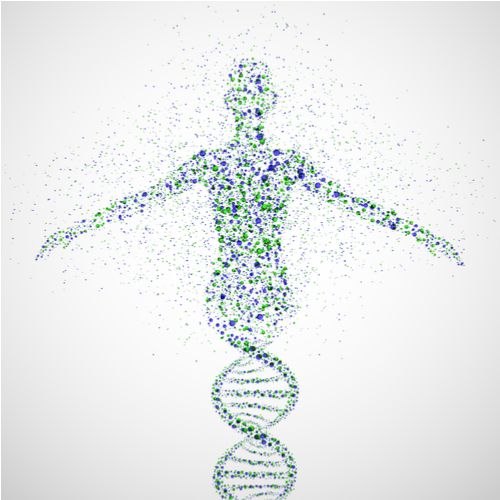

Have you ever wanted to know how your genetic makeup affects your weight, lifestyle or risk of disease? Do you want to know the best way to make sure you live a long, happy and healthy life? As part of our Transformational Wellness Plans, the use of genetic profiling technology is perhaps the most advanced and exciting, helping you live life to the fullest. Our genetic diet testing and DNA profiling will help you understand your genetic profile and how your lifestyle factors are impacted by it. With our assistance, you can use the science of nutrigenomics to help transform your life for the better.
The basic building blocks of our bodies are our cells, which contain our DNA. Through our DNA our genes interact with the rest of our body and can have a massive impact on how susceptible we are to disease and other illnesses. It has recently been discovered that our genes are not simply static but react and express themselves depending on how we live our life.
Yes, that’s right – your genes are not your destiny. Even though you have the same set of genes throughout your entire lifetime, you do have the potential to speed up or slow down the enzymes they code for, or compensate for their effects, simply by making the right dietary and lifestyle choices. You can literally dial them up or down when you’re armed with the right information.
Can you see the potential of having that information?
Things get really interesting when we introduce nutrigenomics. Nutrigenomics is the science of how nutrients, and other dietary compounds and lifestyle choices, influence your genes. Through understanding your own genetic profile, you can identify the dietary and lifestyle factors that may be causing health concerns, and in turn, maximise your own dietary and lifestyle choices to promote optimal health. Although a new realm of science, nutrigenomics is able to show how your diet influences your genome, and may be the key to anti-ageing, as well as cancer prevention and weight management.
What this means is that through genetic profiling you will be able to find answers to questions such as;
But most importantly, nutrigenomics will give you the answers to questions such as;
That is the difference. Genetics is the what, nutrigenomics is the how. It provides us with evidence-based dietary, lifestyle or exercise interventions to help change the expression of your genes.
I want to share the information of when I did my genetic test so that you can see what my results are and how they affect what I do in my daily life. First, I had to get my test done!
The test itself is simple and non-invasive – a swab taken from the inside of the cheek is all that is needed, making it accessible to virtually anyone.
Firstly, there are no ‘good’ or ‘bad’ genes, and we all have inherent genetic strengths and weaknesses. How they manifest is up to how we live our lives. They manifest based upon our environment – and that is diet and lifestyle. Ayurveda was ahead of its time when it said we can change who we are by looking at diet and lifestyle. Today’s interpretation of what Ayurveda has always known is the exciting field of Epigenetics.
Of course, these are just my susceptibilities – they won’t necessarily express in this way as long as I continue to follow a good diet and lifestyle for who I am. For example, despite my genetic tendencies, I am not overweight, and my blood lipids are perfect. On the other hand however, I have been chronically low in vitamin B12 in the past, I tend towards revving up at night, and am most certainly a ‘worrier!’.
If I were to zoom in on a few key genetic variants, I am able to find out some very interesting information. Let’s take a look at just a couple below.
In my liver detox profile, my variant of the GSTP1 gene indicates I have a strong sensitivity to chemicals, including herbicides, pesticides and heavy metals. Interesting at one period in time when I was under a lot of stress – I did have chemical sensitivities. Additionally, with this gene variant, the enzyme that joins with estrogen metabolites to render them safe and ready for excretion may be working a lot less efficiently than it should.
This hypersensitivity can manifest for me as headaches, fatigue, brain fog and digestive distress. However, armed with this information, I am able to support my total detoxification process simply by low-toxing my life. I opt for natural cleaning and personal care products, avoid plastic, smoke, chemicals, processed foods and choose organic where I can.
Dietary wise, I’ve learnt that daily intake of vegetables from the cruciferous family (broccoli, cauliflower, Brussel’s sprouts) and allium family (garlic, onions and leeks) is a must.
Since making these changes, I have noticed less headaches, more clarity and energy, and clearer skin.
Vitamin D is synthesised in the skin on exposure to sun. But it needs to interact with receptors on the outside of your cells in order to exert its effects – which include modulation of the immune and inflammatory processes in the body. Given I have a polymorphism that desensitises these receptors somewhat, I am more prone to immune dysregulation, and consequently susceptible to inflammation.
This information is valuable – because thanks to nutrigenomic findings, I know exactly which natural herbs I need to help dial up those receptors and optimise my health – potentially helping prevent those inflammatory flare ups.
In the methylation and homocysteine profile, the COMT gene is responsible for clearing your stress, sex and feel good hormones from your system once produced. My variant shows the enzyme this gene codes for is underactive. This means once those stress hormones are produced, they linger for a very long time. This is true for me clinically – I am sensitive to stress, I have trouble winding down, can be prone to sleep challenges, and am a recovering type A personality!
Because I have this gene variant, I need to limit coffee, green tea and quercetin – as they further inhibit COMT.
By the time I had reviewed my results, I was able to define exactly what type of diet would best support me moving forward (a moderate fat, lower starch, Mediterranean style diet), and prepare a shopping list of foods that would give me the most bang for my buck.
I was also relieved to discover that moderate exercise (such as brisk walking) far better worked for me than high intensity (phew!), that fasting probably wasn’t such a great idea, and that stress management and reducing toxin exposure should be a priority long term.
How empowering to have all of this information!
I hope I have demystified the area a little for you, and that it has demonstrated how much information you can glean from these reports – the examples above speak to just 3 of the 120 genes tested.
At The Holistic Highway, our integrative approach to health means we can help you choose the right nutrition, herbs and exercise to ensure that your genes aren’t working against you. We can then work with you to tailor a genetic diet to help reach a desirable weight, slow down the ageing process, or target specific lifestyle factors to improve your health. Although it may sound too good to be true, the advances in genetic diet testing have allowed The Holistic Highway to implement cutting edge technology that is changing lives.
Interested in how this can help you personalize your health plan?
Set up a complimentary consultation here.
In health,


The Holistic HIghway integrates traditional Western medical practices with Ayurveda medicine, creating a focus on prevention through nutrition, diet, and exercise; use of the latest genetic testing and other diagnostic techniques; and prescribed combinations of botanical medicines, supplements, therapeutic diets, detoxification programs, or stress-management techniques.

Integrative Health Expert | Ayurveda Practitioner | Author | Speaker
Kerry is a globally recognized leader in integrative medicine and the science of health known as Ayurveda. She is passionate about raising awareness of the need for a change in contemporary medicine that focuses on patient empowerment and a health-based (rather than disease-based) medical system.
Kerry is connected with The University of Pittsburgh Center for Integrative Medicine and remains a pioneer in the field of integrative medicine where she has developed a personalized system to manage chronic disorders by incorporating fundamental changes in diet, behavior, and stress while focusing on genetics.
This individualized program is so successful that many of her clients have achieved maximum healing and vitality after years of chronic problems!
More to Explore
Contact
Disclaimer
The sole purpose of all the website content is to educate and provide information about Integrative Health, Genetics and Ayurveda.This information is not intended for use in the diagnosis, treatment, cure. or prevention of any disease.
Stay Connected